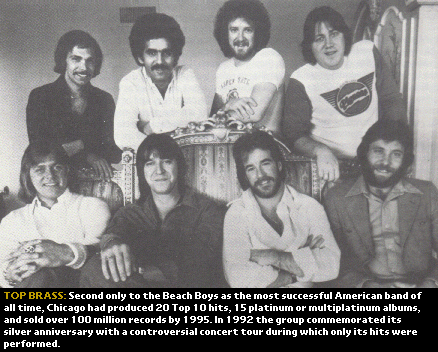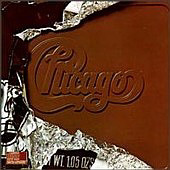|
"If You Leave Me Now" Chicago Columbia 10390 Oct. 1976 Billboard: #1
From the beginning, however, the band disputed the comparison. "Our roots are basically rock," singer-keyboardist Bobby Lamm pionted out in a Down Beat interview, "but we can and do play jazz. Blood, Sweat and Tears is basically a jazz-oriented combo that can play a lot of rock." Living up to their name, all but Lamm hailed from the Windy City, and he moved there as a teenager. "We were friends before ny of this (success) started happening," woodwind player Walter Parazaider told the New York Post in 1977. "Personally and musically, we're a family," Lamm said. The group's big break came when James William Guercio, a college friend who had moved to Los Angeles, became their manager and producer. Guercio was then influential at Columbia Records through his production work with the Buckinghams and Blood, Sweat and Tears. He moved the members of Chicago Transit Authority to Los Angeles, paid their rent and found them work. As the house band at the Whisky-a-Go-Go, they gained a strong local following and, with Guercio's help, signed with Columbia in 1969. They soared to superstardom by sticking to a well-honed formula of jazz-rock songs, funky licks and impeccable musicianship. Although this combination proved unbeatable, Chicago never became the darlings of rock or jazz critics. In fact, the band was often villified as "purveyors or pap" and the "Mantovanis of rock." But Chicago looked the other way and kept a steady string of albums bouncing up the charts, all identified merely by Roman numerals. "Our albums are simply documents of where we were playing at the time of their recording, nothing more," Lamm told Michael Ross of Rock. "So any upward movement, any gains that have been made since the first album, are purely unintentional. The music just happened that way." For an album-oriented band, Chicago did not shrug off the singles market. Between 1970-1975 they scored 10 Top 10 singles, including "25 or 6 to 4" (#4), "Saturday in the Park" (#3), "Just You 'N' Me" (#4) and "Old Days" (#5). Their Chicago X album provided their biggest single yet, "If You Leave Me Now," a beautiful, romantic ballad written by Cetera. It debuted on the Hot 100 at number 60 on August 14, 1976, and moved to the top of the chart 10 weeks later. What is the secret to Chicago's long-term appeal? "Chicago is the most successful experiment in group therapy ever to go down in history," said Lamm in Down Beat. "There have been times when each of us wanted to walk away... (But) if somebody is obviously egoing out, there's six of us to deal with and we'll get together and give him a knuckle sandwich." - Fred Bronson, The Billboard Book of Number One Hits, Billboard, 1988.
No comments so far, be the first to comment. |


